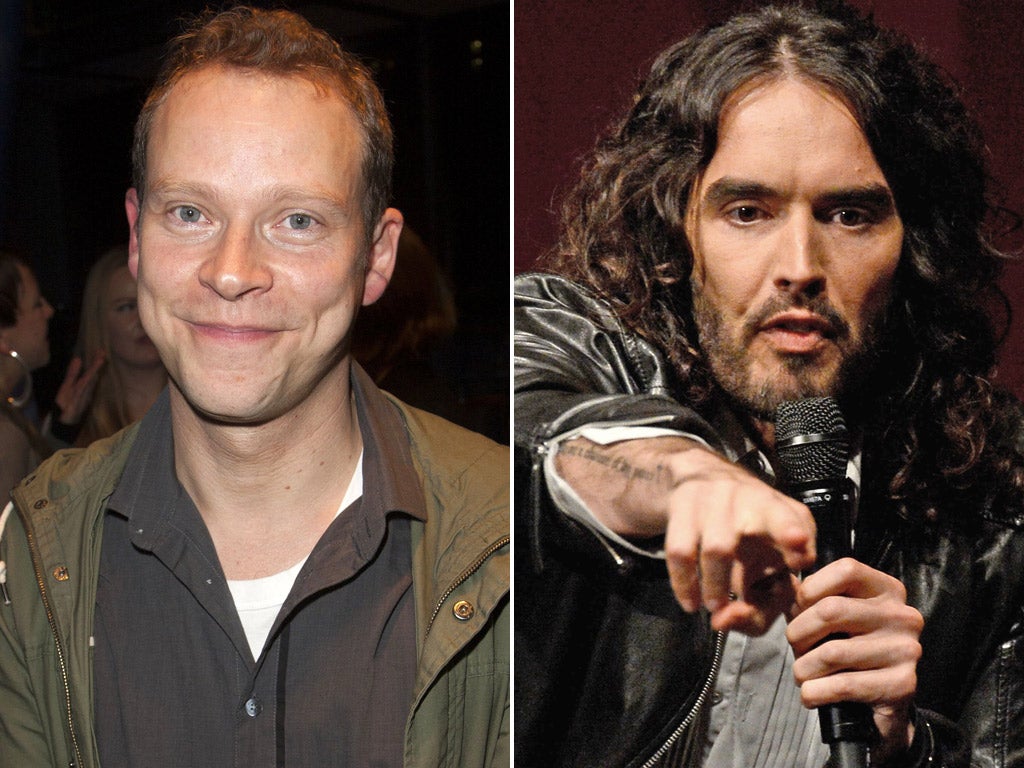Comedians at war: Choosing between Russell Brand and Robert Webb
At least there will be some light entertainment available on the barricades


Your support helps us to tell the story
From reproductive rights to climate change to Big Tech, The Independent is on the ground when the story is developing. Whether it's investigating the financials of Elon Musk's pro-Trump PAC or producing our latest documentary, 'The A Word', which shines a light on the American women fighting for reproductive rights, we know how important it is to parse out the facts from the messaging.
At such a critical moment in US history, we need reporters on the ground. Your donation allows us to keep sending journalists to speak to both sides of the story.
The Independent is trusted by Americans across the entire political spectrum. And unlike many other quality news outlets, we choose not to lock Americans out of our reporting and analysis with paywalls. We believe quality journalism should be available to everyone, paid for by those who can afford it.
Your support makes all the difference.Unlike sections of the hipster Left and a great number of otherwise non-political grown-ups, I am not sold on Russell Brand and to say that the new controversy between Brand and Robert Webb is uninspiring is to state the bleeding obvious.
Whether you choose to lionize or denounce them, at least Lenin and Trotsky knew roughly what a revolution was. Listening to Brand and Webb spar over modes of democracy is rather like hearing Anjem Choudary and Tommy Robinson debate multiculturalism.
Personally, I think Webb is correct to pillory Brand for suggesting that we should all abstain from voting, though not necessarily because liberal democracy is the best we can do.
Brand’s rejection of electoral politics smacks of moralism and political immaturity and it put me in mind of some the very early Occupy assemblies. Political movements are many things, not least a kind of kindergarten for radicals, and to be fair to Brand he was taking his baby steps on primetime TV rather than on the steps of St. Pauls Cathedral.
One of the first lessons in any kind of politics – progressive or otherwise – is that it is simply not enough to declare that the world would be better if everybody just loved each other and the same can be said for asserting that just not voting is the way forward.
Simply ignoring the system, rather like founding a vegan anarcho-punk love commune, will not make it go away however much as we would like it to. The fact is that voting is not useless; it is just a highly ineffective way to change the world. Exercising the hard-won right to vote is not selling out to the system any more than using the NHS to get your bad back looked at is a counter-revolutionary act. But if Brand’s is a failure of politics, then Webb’s shortcoming is a failure of both imagination and citation.
In his riposte Robert Webb shows a reactionary streak and a dubious grasp of politics and history. He (rightly, in my view) praises liberal democracy, while claiming that political revolution always ends in gulags and bloodshed. Webb, clearly an educated man, has either forgotten or simply does not know that liberal democracy is itself the product of a political revolution. See: the English Revolution.
We might also note that liberal democracies are quite capable of making their own gulags and are not at all adverse to a spot of bloodletting. It is fair to argue that Webb’s “advanced liberal democracies” look a little less shiny when you consider them in the light of the wars they persist in starting, the global network of military colonies they maintain and facilities like Guantanamo Bay?
Webb might also be interested to know that while revolutions, rather like little girl’s birthday parties, can turn certainly violent, they are not gore-spattered as a rule. The October Revolution itself was a rather peaceful affair.
We might spend a moment examining why revolutions turn violent when they do and note that it is more often due to the determination of a particular regime to hold onto power at any cost than to the bloodthirstiness of the peasants that they descend into savagery.
Even if a revolution does makes it past the first hurdle there is the risk of a counter-revolution; which is the point where things tend to get really bad.
It is worth considering that in the average revolution, like those cheeky little upsurges in North Africa recently which I’m sure Robert Webb would applaud, the regime generally has something of an advantage over the protestors when it comes to tanks, tear gas, sniper rifles and well-furnished torture chambers. And we might also note that these game-changing bits of hardware are routinely supplied by, yes, you guessed it, “advanced liberal democracies”.
In a comic misreading of Orwell, Webb prescribes Britain’s most lettered snitch to Brand. Orwell was a critic and opponent of authoritarianism but he was not, as Webb seems to think, an opponent of radical social change - which is fundamentally what revolution is all about. His very best work, Homage to Catalonia, (quite famously) records Orwell’s own time as an active (and, in that case, armed) participant in a radical, revolutionary struggle.
If Webb and Brand are the most politically conscious comedians out there, comrades, I worry for the cause of democracy – be it radical or liberal. But at least there will be some entertainment on the barricades with Brand and later during the show-trials run by Judge-Commissar Webb. Presumably Live at the Apollo.
The over-arching political question raised by this war of word remains. Which one is better? Revolution or liberal democracy? Perhaps Webb’s End of History-type assertion is right and liberal democracy is the least worst option and perhaps Brand is genuinely for a better world.
My suspicion is that these men are not disingenuous. Just clumsy. And how can people decide which is better if both liberal democracy and revolution are being so grossly misrepresented? Karl Marx anyone?
Join our commenting forum
Join thought-provoking conversations, follow other Independent readers and see their replies
Comments